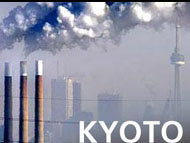There are times when I cannot understand the logical path that the left takes in order to come to some of their conclusions.
For example, the other day, Stephane Dion floated a trial balloon on his idea that perhaps instead of handing Taliban detainees over to the Afghan people, we should import them and detain them here in Canada!
Nevermind that Dion and Jack Layton’s activist base have been advocating for the release of men linked to al Qeada in Canada and held on security certificates. They advocate that if we can’t deport them back to the backward countries that may torture them, we shouldn’t detain them here but rather release them into the public. Now, consider Dion’s plan: import Taliban fighters for detaining, and failing the stomach to detain them — the logical progression and historical record goes — release them into the general Canadian public when leftwing activists condemn the Canadian government for holding combatants without charge.
Most times, while logic is lacking, left-wing positions can often be explained by a sense of self-loathing as these revolutionaries are dyspeptic of their presence in our modern Western civilization.
Let’s look deeper into the intellectual pretzel of Dion and Layton’s crowd.
In a March 2007 article in the Globe and Mail, Amir Attaran wrote:
Transport our detainees from Afghanistan to prisoner-of-war camps in Canada. This sounds awful, but that is a shrill and unhistorical analysis. Starting in June of 1940, Canada transported about 40,000 German and Italian enemy combatants to this country and held them in camps in Alberta, Ontario and Quebec. Those enemies were treated humanely. They were fed even as Canadians suffered under food rationing. They were given democracy classes, so they could spread those ideas in their fascist homelands. When the war ended, they went home; some returned as immigrants.
All of this was expensive, but Mackenzie King decided Canada should uphold the Geneva Conventions — and we did.
Not only would this option show Canada at our humanitarian best, but it poses vital questions. If Mackenzie King could imprison 40,000 European enemies without devastating Canada’s war effort, then how can it be seriously contended that Stephen Harper cannot now imprison roughly 40 Afghan enemies (the number detained by the Canadian Forces from 2002 through mid-2006)? Mr. O’Connor says the Canadian Forces will always follow the Geneva Conventions. If that’s so, why does the military fail to provide Geneva protections to 0.1 per cent of detainees, compared to the Second World War historical norm?
The heart-rending answer to these questions appears to be race. Canada’s inability to treat European and Afghan enemies on equal terms indicates that our military and foreign-policy establishment may still be dominated by a Eurocentric ethos. The current detainee policy suggests a subterranean racism that lags decades behind Canada’s contemporary reality as a multicultural state.
A primary concern for the Allies and Canadian forces during the Second World War was that Germans and Italians would escape or be liberated by their comrades and rejoin the fight. The removal of 40,000 prisoners from the European theater made sense strategically. If Canadians have captured 40 Taliban fighters, this number is certainly more manageable (and less significant of a strategic concern) when it comes to detainment.
Layton and Dion and their supporters on the left are inconsistent when it comes to their claimed ideology of rights and their policy position that we ought to pull out of Afghanistan. Why do these leaders want to abandon the Afghan mission when the alternative is unthinkable from a human rights perspective? To the Liberals, was the Charter a practical document for Canadian rights or does it represent a global ideal? Women in parliament? Girls in schools? The crackdown by the Taliban would be horrendous if Canada left. In fact, why was World War II worth the fight and why would Layton and Dion suggest that we shirk our responsibility to stop fascism in Afghanistan? Is it the Eurocentric ethos of the NDP and Liberal Party? Or is it more consistent with the trend of reductio ad americanum practiced by the left?
Who is Amir Attaran? Unfortunately, he’s close to the only seemingly sane faction of the Liberal Party. The Globe and Mail provides some information:
Amir Attaran, now Canada research chair in law, population health, and global development policy at the University of Ottawa, was a research fellow at the Kennedy School during Mr. Ignatieff’s time at the Carr.
He ran afoul of an influential faculty member and the school’s administration over a line of academic inquiry he insisted on pursuing, and found himself about to be booted out.
He brought his troubles to Mr. Ignatieff, who gave him office space and mentoring support until he could find another academic home. “Michael stuck up for me against some extremely nasty attacks,” Prof. Attaran says.
Tous ensemble in a twisted stew of self-loathing. It is illogical to suggest that we must transport Taliban fighters to protect them from torture while advocating that we withdraw from Afghanistan leaving women and vulnerable minorities to certain dehumanization.
Canada is in Afghanistan to enable the vulnerable to stand up, but we must also work to protect the human rights of all Afghanis. While war never happens as planned and calls for constant refinements to operations on the ground, we must always work towards maintaining our fundamental principles of freedom, democracy and the rule of law so that others may enjoy them too.

